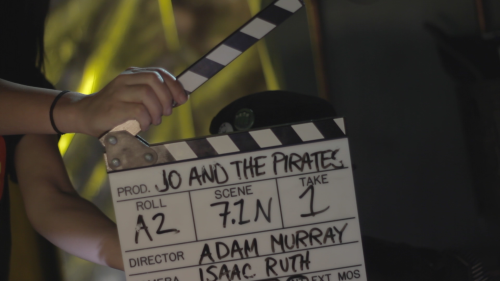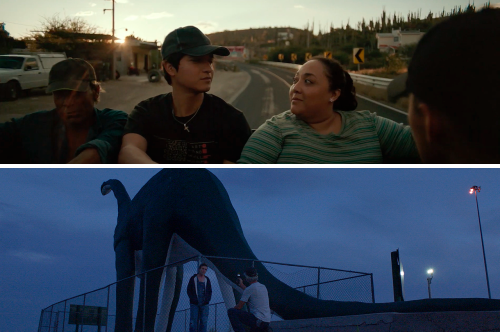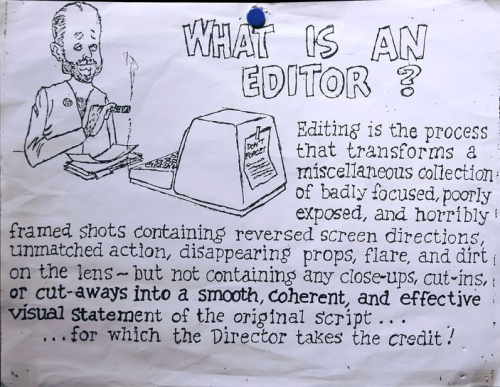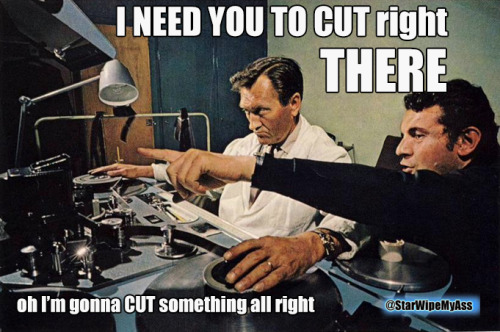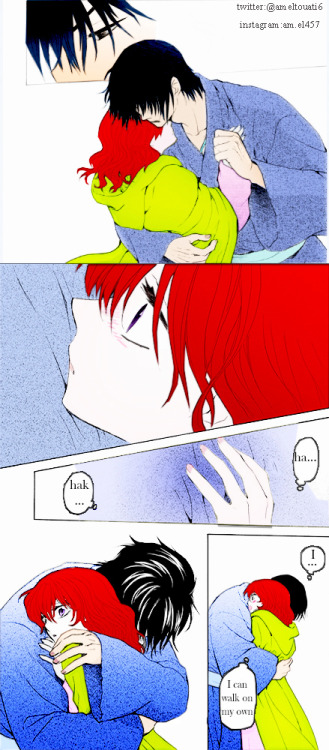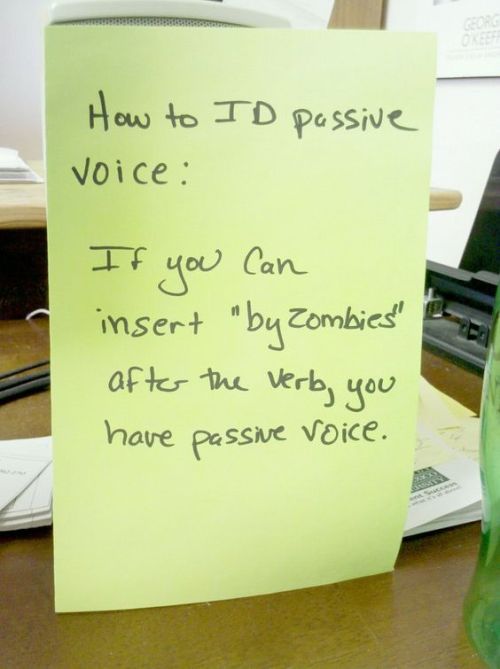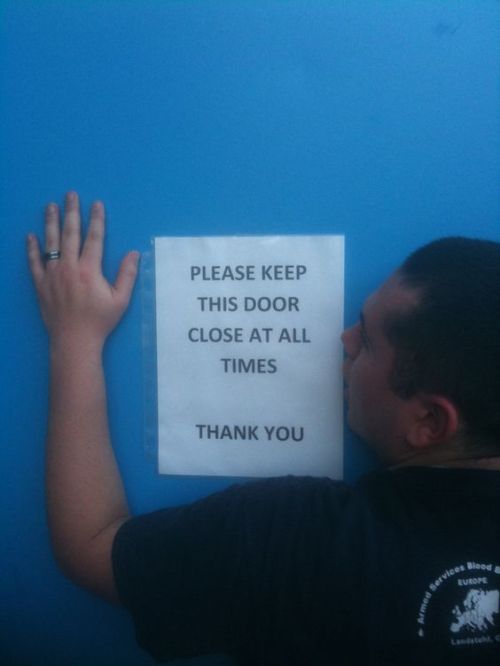#editing
Apparently a lot of people get dialogue punctuation wrong despite having an otherwise solid grasp of grammar, possibly because they’re used to writing essays rather than prose. I don’t wanna be the asshole who complains about writing errors and then doesn’t offer to help, so here are the basics summarized as simply as I could manage on my phone (“dialogue tag” just refers to phrases like “he said,” “she whispered,” “they asked”):
- “For most dialogue, use a comma after the sentence and don’t capitalize the next word after the quotation mark,” she said.
- “But what if you’re using a question mark rather than a period?” they asked.
- “When using a dialogue tag, you never capitalize the word after the quotation mark unless it’s a proper noun!” she snapped.
- “When breaking up a single sentence with a dialogue tag,” she said, “use commas.”
- “This is a single sentence,” she said. “Now, this is a second stand-alone sentence, so there’s no comma after ‘she said.’”
- “There’s no dialogue tag after this sentence, so end it with a period rather than a comma.” She frowned, suddenly concerned that the entire post was as unasked for as it was sanctimonious.
And!
- “If you’re breaking dialogue up with an action tag”—she waves her hands back and forth—”the dashes go outside the quotation marks.”
Immobility
Immobility
A thread about not being able to get stuff done (see also on my blog) ⬇️
So it’s 2020 part three and I feel like I’m walking through knee deep treacle. It’s possible that I am undermedicated for dealing with Pandemic World. It’s also possible that any dose that would make me feel better would also knock me right out. Which is counter productive when you’re trying to get stuff done.
I’ve been failing to get stuff done for a while now, since before Christmas, and so…

I’m an editor and writer, and I do not correct others’ grammar unasked on social media. I used to in my 20s, thinking it made me look smart, but now I know it just made me look like an asshole.
Besides, I get paid to proofread now, so no way are you getting it for free.
People sometimes tell me, “But I can’t help it!”, re correcting grammar.
Yes! Yes you actually can! Who is controlling your fingers? Look, it’s you!
I believe in you!
P⬤21
Edición
The Father
Yorgos Lamprinos
First Cow
Kelly Reichardt
I Carry You With Me
Enat Sidi
Nomadland
Chloé Zhao
Una Película de Policías
Yibrán Asuad
Pieces of a Woman
Dávid Jancsó
Fotografía
First Cow
Christopher Blauvelt
Dune
Greig Fraser
Minari
Lachlan Milne
Nomadland
Joshua James Richards
Pieces of a Woman
Benjamin Loeb
Una Película de Policías
Emiliano Villanueva
Efectos Visuales / Especiales
Dune
Brian Connor, Paul Lambert, Tristan Myles, Gerd Nefzer
Eternals
Matt Aitken, Daniele Bigi, Stephane Ceretti, Neil Corbould
Finch
Burt Dalton, Aymeric Perceval, Anthony Smith, Scott Stokdyk
Godzilla vs. Kong
John Des Jardin, Bryan Hirota, Pier Lefebvre, Michael Meinardus, Kevin L. Sherwood, Kevin Andrew Smith
No Time to Die
Chris Corbould, Jonathan Fawkner, Joel Green, Charlie Noble
Shang-Chi and the Legend of the Ten Rings
Joe Farrell, Dan Oliver, Christopher Townsend, Sean Noel Walker
Post link
Swimming with thoughts about editing, publishing, and so much more as we approach the publication of GO SET A WATCHMAN. Too much to unpack right now, and too much that will probably never be known. Questions that will likely never be genuinely answered (that frustrate and worry me).
For now, I hope we can try to look backward at drafts and craft and beginnings, and learn something from that … and not forward to sequel. Direction makes a difference.
Lately I’ve seen some posts by a number of writers concerned about the editing process. In particular, what happens when your editor starts trampling your voice? Or when they start changing things that are clearly a matter of taste, not structural or grammatical issues? Or when their comments are rude or condescending? Or when you don’t even recognize your own book anymore, and not in a good way?
Basically, what happens when you get your manuscript back from your editor, and you get that sick feeling in your stomach like “This is ruined”?
First, right off the bat, without even getting into whether the editor is right or wrong, it’s a perfectly natural and acceptable reaction when you have some hardcore edits that involve massive revisions. This is especially true early in your career, but trust me, it doesn’t magically go away. It’s tough on the ego to see that manuscript you worked so hard on come back slathered in red. It’s demoralizing. And it’s okay if you feel that way!
You know what I do when I get a set of edits? I go through it one time and let my inner toddler go nuts. I mentally flail and push back and holler and roll my eyes and “oh my GOD that is BULLSHIT” and I eat a cookie. Then I put the manuscript aside. The next day, I take a deep breath and go through it again, and more often than not – especially now that I’m mostly indie and I hire editors who I mesh with – the comments and changes aren’t so bad after all. So I 100% give you permission to do that if getting it out of your system helps.
THAT BEING SAID.
The inner toddler isn’t always wrong. When I read through it the second time, if my eyebrows keep climbing until they touch my hairline, it’s possible that something is amiss here besides my ego needing a nap.
So what happens when you and your editor disagree? How do you know if the problem is the editor or the manuscript? And how do you handle it? Well, that can be tough, and the answer usually comes down to communication.
But let me say this upfront: it’s not just you. After 11 years in print, I’m creeping up on 200 titles in my catalogue. I have, shall we say, extensive experience with editors, and it hasn’t always been good.
With one publisher, I had to hire a copy editor on my own to go through and undo all the errors *their* copy editor inserted, not to mention fix all the ones they’d missed. That’s a pretty objective problem. If your editor is missing mistakes or ADDING mistakes, then you need a new editor. Period. Do NOT be afraid to go to your senior editor (or your agent), tell them what the problem is, and request someone new. If the problem isn’t resolved or you’re told “this editor does a perfectly good job,” then consider that a sign that you and the publisher have differing standards on quality. You might have to grit your teeth through the process on your currently contracted book(s) (that’s why I hired an outside editor for mine), but consider not submitting to that publisher in the future. If you’re an indie author who hired your own editor, you can fortunately choose not to use them again.
Sometimes it’s a personality clash or a difference in taste or style. Maybe the editor’s method of communicating rubs you the wrong way. I had an editor who thought that since I’m fairly sarcastic with a dry sense of humor most of the time, that would be an effective way of communicating via comments in a manuscript.
Spoiler: it was not. I have a thick skin when it comes to writing, but if I feel like my editor is making fun of me, talking down to me, or yelling at me, I shut down. I can’t work like that. Solution: ask the editor to do things differently or ask for another editor. DO NOT grin and bear it if your editor is communicating in a way that’s hurtful or counterproductive. You’re equal partners here, and you have a right to be treated with respect. It’s okay to say so if you feel that’s not happening.
I also had an editor who did line edits by making the change they wanted to see rather than putting in a comment about how and why they thought it should change. I really liked that because in comparing my original to the tracked change, I could see what they were getting at, and even if I didn’t accept their change in its entirety, it was a good way to communicate the issue to me. For us, it worked really well.
But that approach had the opposite effect on another author, who felt like the editor was stomping on their voice and just changing things willy nilly. Neither of us was wrong, it was just different people responding to different means of communication. In that instance, simply approach the editor, explain why you would prefer they made comments instead of changes, and see what happens. If they’re willing to do so, great! If not, you and the editor might not be compatible. That doesn’t make you a diva or them a bad editor, it just means you’re not a good match. That’s okay!
Also, if they’ve made a suggestion or recommended a change, and you disagree with it or don’t understand it, sometimes just typing out your concerns in an email or a reply to their comment can resolve it. I can’t tell you how many times I’ve been in the middle of explaining to an editor why I wanted to keep something the way it was, and I talked myself right into a solution to their comment that I was happy with. The solution wasn’t always what they’d initially recommended, but the result was that the problem they’d pointed out was fixed.
Which is another thing to keep in mind: if your editor suggests you do X to fix a problem, but you don’t like X, think about WHY they want you to do it. What is X fixing? One of my editors told me “There isn’t enough tension in this scene, so I recommend cutting it by 10% to tighten it up.” I tried. Lord, I tried. But there was no way I could cut anything without losing vital information. So I revisited the comment. The problem wasn’t that it needed to lose 10%. The problem was there wasn’t enough tension. In the end, I ratcheted up the tension….by *adding* 10%.
So sometimes it’s just a matter of stepping back and asking yourself, is this editor stomping all over your voice and tearing apart your work in a way you disagree with? Or is it a difference in communication style? Are they trying to hijack my book? Or does their suggestion illustrate a problem which I can fix in a way that is more satisfying to me and more in line with my story?
Also, a lot of writers have come of age hearing that you toe the line and do what your editor tells you to, or else you’ll get blacklisted for being difficult. And to some extent, sure, you CAN cultivate a reputation for being an unreasonable diva, but there is an enormous gap between diva status and being a professional asking to be treated accordingly. If you feel your editor is being rude or they’re hurting your story, say so. If you think there’s a lapse in communication somewhere, say so.
If you don’t understand something, ask. When my current editor makes suggestions for significant changes, it’s not unusual at all for me to email her first and say “I’m thinking of doing X, Y, and Z to fix A, B, and C. What do you think?” Or “You suggested A, B, and C, but I think if I do X, Y, and Z it’ll work better because… What do you think?” And we’ll go back and forth a little before I ever touch the manuscript. It works beautifully, and I’m always confident going into the edits that I understand what the issues are and how to fix them. You’re not alone when you’re editing! Your editor is there to help you and to work with you, and if they won’t do that, they’re not doing their job!
Seeing a pattern here? Communication is crucial. If you aren’t comfortable with something, or you don’t understand something, or the way the editor is communicating isn’t working for you, it’s okay to speak up. It goes without saying that you need to be professional about it, but don’t buy into the idea that for authors, “being professional” means gritting your teeth and taking whatever your editor shells out.
And yes, if you absolutely cannot work with an editor – if just thinking about looking at that manuscript spikes your anxiety like a tornado siren just went off because the comments are rude, the changes are uncalled for, or something is just OFF – it is acceptable to say “This author-editor relationship isn’t working for me.”
Yes, you can break up with your editor.
Obviously that’s easiest for indie authors. We just…don’t hire that editor again. With publishers, it’s a little more complicated, but it CAN be done!
In just over a decade, there has been one occasion where I stopped midway through the edits, emailed the senior editor, and said “I’m not working with this person anymore. I want a new editor.” This came after a round of edits left me so emotionally wrung out and beaten down that I was literally in tears over it, and if you know me, you know that says A LOT. The first draft of my email basically said “You know what? This book is obviously garbage. Let’s just cancel it.” I felt that bad about the whole thing. But after talking to some industry friends, I pulled myself together, realized the book was not the problem, and I sent a firmly-worded but still professional email to my senior editor.
You know what happened? I got a new editor. We scrapped the existing edits, started over, and it was like night and day. The edits were still intense, but they were reasonable, and instead of feeling like I was being told to nuke the book from orbit and start over, I felt like I was course correcting. In the end, readers loved the book, and I continued working with that editor for a long time because we meshed so flawlessly.
If you find yourself in a situation like this, and you’re not sure if it’s just you, run it by some trusted writer buddies. Ask some long-published veteran authors. It’s okay to say “Something about this doesn’t feel right – what do you think?”
Don’t suffer in silence! Get feedback from a third party. Talk to your editor. Talk to your senior editor or your agent if you have them. It could be just a simple miscommunication. It could be that you and this editor aren’t compatible. But if no one knows you’re struggling, they can’t help.
And honestly, if there’s one thing I’ve learned in working with literally dozens of editors over the years, it’s that most of them genuinely do want you to succeed, and they want you to be happy with your book. If they do, they’ll also meet you in the middle and try to make the whole process work for both of you. If they don’t, well, then that’s somebody you probably don’t want to work with again if you can help it.
To recap:
- Talk to your editor if you have concerns or if something isn’t working.
- Talk to your senior editor or agent (if you have them) if you think a new editor would be the best solution.
- If you’re truly unhappy with an editor, you might be stuck with them for the duration of one book or series, depending on your contract, but beyond contractual obligations, it’s okay to choose not to work with them again. (And if it’s really not a good situation, push for a different editor.)
- If an author and editor disagree, the author is not wrong by default. Neither is the editor.
- Communicate, communicate, communicate.
- Remember that you are colleagues, and you should expect to be treated accordingly.
- Sometimes calmly explaining to your editor why you disagree with or don’t understand their comment can lead your thought process right to the solution.
- It’s YOUR book. In the end, YOU should be happy with it. Your editor should be on your side.
- You are not obligated to correct a problem in the manner your editor suggested. Most problems have multiple possible solutions!
- It’s totally okay to email your editor and ask for clarification, bounce ideas off them for solutions, etc.
So go forth and bravely tackle those edits, but communicate like whoa and trust your gut if something doesn’t feel right!
it’s not about you can walk ur own or not, I just wanna feel u in my arms, I’ll protect u forever, love u without expectation, I’m totally yours and you are mine
Post link
#Repost @aspiringanika_art
• • • • •
One of the photos I took at @Okashicon this year! It’s of the wonderful @sledgehammercosplay in his Maui cosplay. I didn’t get very many photos this past weekend, but I wanna try to take more photos in the future! If you want the photo for your own page Sledge pm me here or on @aspiringanika
.
.
.
#Cosplay #Photography #Maui #Moana #Disney #Cosplayer #YoureWelcome #Okashicon2018 #Photos #Editing #Digitalediting #NovicePhotographer #Novice #Art
Post link
Me, opening PS to do some Buddie moodboards.
Me, realizing I have no idea for new moodboards.


Writing advice you will probably hate:
▪️DO NOT edit until after your work in progress is finished
Reasons:
1. You will quench your creative flow
2. You will get frustrated
3. It will take 10 years to finish your book and you will still hate it.
4. You’ll beat yourself up
5. editing is more productive once your work is finished.
Ways to avoid this:
1. Keep writing and don’t look back
2. Finish from beginning to literally “the end”
3. Remember, becoming a good writer isn’t magically writing everything perfect the first time around. It’s learning to edit. And edit. And edit again.
Don’t worry, you got this!☺️
Hope Mikaelson | Father’s Daughter
Multifemales | Empty
Katherine Pierce | Mother Nature

